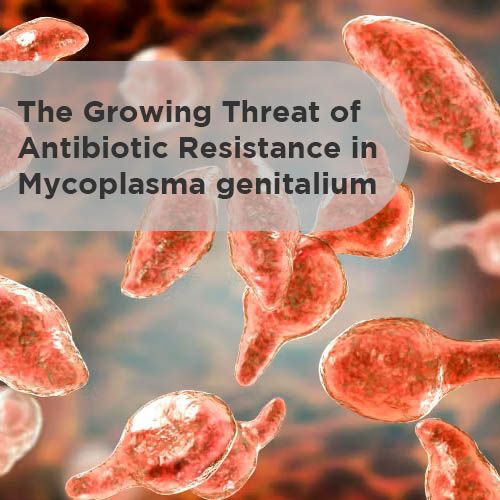
Mycoplasma Genitalium and its high antibiotic resistance
Mycoplasma genitalium (Mgen) is one of the pathogens responsible for non-gonococcal urethritis (NGU). Studies report that approximately 1.3% to 3.9% of the general population is infected with Mgen [1]. A 2021 study in Southern China found that up to 7.2% of clinic patients tested positive for Mgen, with 36.7% being asymptomatic [1]. Another study indicated that Mgen causes about 19.7% of NGU cases in China [4].
Symptoms of Mycoplasma Genitalium
Common symptoms of Mycoplasma genitalium infection include[2]
- Nongonococcal urethritis
- Cervicitis
- Prostatitis
- Balanoposthitis or
- pelvic inflammatory disease
- infertility
Treatment of Mycoplasma Genitalium
Macrolide or fluoroquinolone antibiotics can be used to treat the infection of Mycoplasma genitalium.
The Growing Threat of Antibiotic Resistance in Mycoplasma genitalium
Research shows that 40% to 68.4% of Mgen strains are resistant to macrolides (e.g., azithromycin) and tetracyclines (e.g., doxycycline) [1,2]. Additionally, 4.5% to 20% exhibit resistance to fluoroquinolones (e.g., moxifloxacin) [1-5]. Alarmingly, around 8.6% of infections show dual resistance (to both macrolides and fluoroquinolones) [6].
The major challenge with Mgen is its rapidly increasing antibiotic resistance. Some patients receive antibiotic treatment but fail to fully eradicate highly resistant Mgen strains, leading to recurrent infections and further escalation of resistance. Researchers warn that rising resistance to azithromycin and doxycycline could lead to widespread untreatable Mgen infections [2].
The medical community attributes this crisis to suboptimal treatment, localized antibiotic misuse, and overuse of antibiotics [2-7].
Antibiotic Resistance Testing for Mycoplasma genitalium
Traditional culture-based methods for Mgen are extremely difficult, with low success rates and long turnaround times (weeks to months), making resistance testing impractical. Currently, the only viable approach is molecular genetic testing, which detects single nucleotide polymorphisms (SNPs) in Mgen's 23S rRNA (macrolide resistance) and parC (fluoroquinolone resistance) genes [2-5,7].
While the demand for Mgen resistance testing is urgent in Hong Kong, very few private laboratories offer this service. As a leading medical provider, Urban Medical has successfully introduced DNA tests for macrolide (23S rRNA) and fluoroquinolone (parC) resistance. This enables doctors to make informed clinical decisions and prescribe targeted antibiotic therapy, ensuring precision treatment.
Who Should Consider Mgen Resistance Testing?
- Individuals with confirmed Mgen infections who have not recovered
- Patients with recurrent or persistent urethritis
- Those newly diagnosed with Mgen infection
Test of cure for Mycoplasma genitalium
Even if symptoms resolve, all Mgen-positive patients should undergo a Test of Cure (TOC). TOC should be performed no earlier than 4-6 weeks after treatment to avoid false-negative results. If TOC fails, antibiotic resistance or reinfection should be suspected.
Pricing for Mycoplasma genitalium Resistance Testing
- $1,350 HKD, Mycoplasma genitalium & Macrolide resistance test (23S rRNA)
- $1,350 HKD, Mycoplasma genitalium & Fluoroquinolone resistance test (parC)
- $2,300 HKD, Mycoplasma genitalium & Resistance Combo test (23S rRNA + parC)
References:
[1] : Macrolide and fluoroquinolone associated mutations in Mycoplasma genitalium in a retrospective study of male and female patients seeking care at a STI Clinic in Guangzhou, China, 2016-2018. BMC Infect Dis 2020 Dec 11;20:950.
[2] Outcomes of Resistance-guided Sequential Treatment of Mycoplasma genitalium Infections: A Prospective Evaluation. Clinical Infectious Disease, 2019:68 (15 February)
[3] : Antibiotic Susceptibility Profiles of Mycoplasma Hominis and Ureaplasma Urealyticum Isolated During a Population-Based Study Concerning Women Infertility in Northeast Romania. Braz J Microbiol 2011 Jan-Mar;42(1):256–260.
[4] Li Y, Su X, Le W, et al. Mycoplasma genitalium in Symptomatic Male Urethritis: Macrolide Use Is Associated With Increased Resistance. Clin Infect Dis. 2020;70(5):805-810.
[5] Pond MJ, Nori AV, Witney AA et. al. High prevalence of antibiotic-resistant Mycoplasma genitalium in nongonococcal urethritis: the need for routine testing and the inadequacy of current treatment options. Clin Infect Dis. 2014;58(5):631-637.
[6] Murray GL, Bradshaw CS, Bissessor M, et al. Increasing macrolide and fluoroquinolone resistance in Mycoplasma genitalium. Emerg Infect Dis 2017; 23:809–12
[7] Dorothy AM, Yusha Tao, Hannah Shilling et al. Prevalence of mutations associated with resistance to macrolides and fluoroquinolones in Mycoplasma genitalium: a systematic review and meta-analysis. Lancet Infec Dis. 2020; 20(11):1302-1324)
(Text Only)

